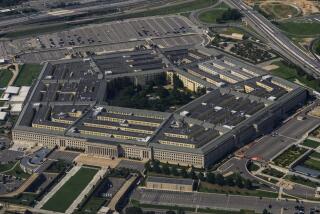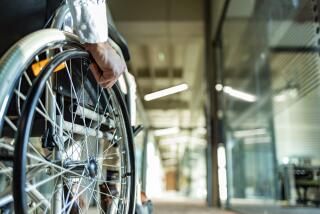Alcohol Still a Problem for Military, Study Finds
The U.S. military still has a serious problem with alcohol abuse, although it has declined, and significant progress has been made in curtailing drug abuse and smoking, according to a study conducted for the Pentagon.
The study found that about 15% of active military personnel are considered “heavy drinkers,” defined as having more than five drinks on one occasion at least once a week. That figure is down from 22% in 1980.
However, researchers credit the reduction not so much to new Pentagon counseling and other programs, but to the changes in the makeup of the armed forces. Service members today are older and better educated than in the past, and more are married and pursuing lifestyles not necessarily conducive to heavy drinking.
The findings, released at an American Psychological Assn. convention in Toronto, come less than a month after the Marine Corps attempted to impose a policy prohibiting married people from enlisting, contending that military life can be harsh on a family.
More encouraging for the Pentagon were findings that the rate of illicit drug use had fallen to about 3% from 27% in 1980. Smoking rates had decreased to about 35% from 51% in 1980.
“Members of the armed forces in 1992 were more likely to be older, to be officers, to be married and to have more education than in 1980, factors that are also associated with less substance use,” the report said.
The study was completed last September by the Research Triangle Institute in North Carolina, which used anonymous questionnaires to survey more than 16,000 active duty service members around the world. The results were compared to the outcome of studies done in 1980, 1982, 1985 and 1988.
Cmdr. Ralph Bally, a policy analyst for the assistant secretary of defense for health affairs, said in Toronto that heavy drinking “is one of the major concerns affecting the health of military personnel.”
“Where we’re at right now is getting military leadership aware of this continuing problem so we can then devise more specific intervention programs” to help problem drinkers, he added.
According to the study, 16.4% of those surveyed said their job performance had suffered over the last year because of alcohol, down from 26.7% in 1980. Their behavior included being late to work or leaving early and performing below their abilities.
The study also found that 7.6% of U.S. forces experienced serious consequences of heavy drinking within the last year, down from 17.3% in 1980. Those problems included being court-martialed, kept off duty at least a week because of illness, or being hurt in an accident or arrested for drunk driving. While noting the declining rate of alcohol abuse, researchers said: “There is still room for considerable improvement.”
The report also showed that Army and Marine Corps personnel were more inclined to be heavy drinkers than were members of the Navy or Air Force.
Officials said it is difficult to compare the rate of heavy drinking among the military with civilian life because of differences in their demographic makeup. But when statistical analysis was done to take that into account, heavy drinking by military personnel stationed in the United States was found to be substantially higher than that for civilians.
More to Read
Start your day right
Sign up for Essential California for news, features and recommendations from the L.A. Times and beyond in your inbox six days a week.
You may occasionally receive promotional content from the Los Angeles Times.







